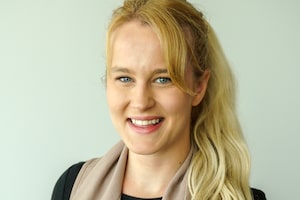Olivia Nuamah, executive director of Pride Toronto, in the group's downtown Toronto office on April 4, 2017.Fred Lum/The Globe and Mail
Pride Toronto will welcome an application from the Toronto Police Service to march in next year’s parade – just six months after it asked the force to rescind its 2018 application.
Pride’s executive director, Olivia Nuamah, stood alongside Police Chief Mark Saunders and Mayor John Tory on Tuesday morning to make the announcement. “They have yet to apply, but we are encouraging an application,” Ms. Nuamah said, adding that the application would be then processed through regular channels.
Discussions over the inclusion of police in the parade are still in their early stages, and Ms. Nuamah didn’t offer specifics on any formal negotiated agreement. One unresolved issue was whether officers will be permitted to carry guns during the annual community event. “Know that we will talk these things through,” she said.
“We’re not going to get policing [right] unless we establish relationships,” Chief Saunders added.
Uniformed police were barred from marching in last year’s parade, with organizers endorsing demands made by Black Lives Matter protesters who halted the march in 2016. Those demands included excluding uniformed officers, police floats and cruisers. Ms. Nuamah said Black Lives Matter didn’t have a role in Tuesday’s decision: “This is Pride Toronto, this is not Black Lives Matter.”
Ravyn Wngz, a Black Lives Matter Toronto organizer, called on Ms. Nuamah to resign after hearing Tuesday’s announcement. “We can’t trust Pride Toronto to support the voices of the community,” she said. “There were no consultations [with] the community on how this would affect us … I just feel like, personally, we can’t trust what Olivia says and then ends up doing.”
In April, the force was asked to rescind its application, amid questions about how seriously it took the disappearances of several men who went missing from the Gay Village since 2010, the disappearance last November of a young woman later found dead by her mother rather than officers, and the 2017 death of a transgender woman. Reviews of those cases by the force are under way.
Constable Danielle Bottineau, an LGBTQ liaison for the force, said Toronto Pride didn’t have any conversations with the police about waiting until those reviews were over to rejoin the parade. The reviews, both internal and external, will take time, she said.
There was some backlash to Tuesday’s announcement. “It feels as though a decision is being talked about and made behind the scenes,” said Shakir Rahim, a board member at the Alliance for South Asian Aids Prevention (ASAAP). The group was one of the signatories who requested that the police withdraw their application earlier this year. (Mr. Rahim said he was not speaking on behalf of the entire organization, but for himself.)
Gary Kinsman, a member of Pride Toronto who wrote to Ms. Nuamah in April, urging her to reject a police presence in the 2018 parade, said the majority of Pride members had voted at an Annual General Meeting to adopt the demands from Black Lives Matter after they were raised in 2016. “[This] is a real violation of the democratic decision of the vast majority of members of Pride Toronto,” Mr. Kinsman said.
Ms. Nuamah didn’t provide specific reasoning for the decision at the news conference, saying that there were many elements that went into it. That has left some people, including Mr. Kinsman, speculating as to whether pressure to secure funding played a role. An open letter released by Pride Toronto on Tuesday said the debate over police inclusion has “come to threaten our very existence as a publicly funded, non-profit community organization.” The release also acknowledged that some may feel that Pride’s decision is premature.
Mr. Kinsman also raised questions over why the announcement took place in the last week before Toronto’s municipal vote, when Mr. Tory is up for re-election. When asked why Pride elected to publicize its decision before, rather than after, the Oct. 22 election, Ms. Nuamah stressed that it was Pride’s news conference, not the mayor’s, but it was “utterly respectful" to ensure everyone who’d been involved in the conversation over the past two years was involved in the outcome.
“The timing being what it may, that does include the mayor," she said. “He was included in these conversations long before the election, and so what we’re doing effectively is coming together as three people who have made commitments to the public, and addressing those commitments directly.”
 Victoria Gibson
Victoria Gibson